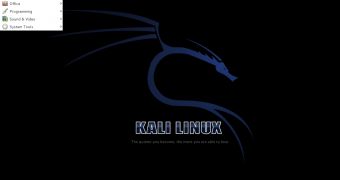Kali Linux 1.0, a more mature, secure, and enterprise-ready version of BackTrack Linux, has been announced by Offensive Security.
BackTrack Linux is one of the most downloaded and famous distributions in the world. It's recognized as the best penetration testing distribution, so it's not a surprise that the developers from Offensive Security have tried to improve upon it.
[admark=1]“Seven years of developing BackTrack Linux has taught us a significant amount about what we, and the security community, think a penetration testing distribution should look like. We’ve taken all of this knowledge and experience and implemented it in our ‘next generation’ penetration testing distribution.
“After a year of silent development, Offensive Security is proud to announce the release and public availability of ‘Kali Linux’, the most advanced, robust, and stable penetration testing distribution to date,” states the official announcement.
Highlights of Kali Linux 1.0:
• The repositories synchronize with the Debian repositories 4 times a day, constantly providing users with the latest package updates and security fixes available; • Each tool in Kali uses Debian compliant packaging; • Many of the tools in the toolbox need to be “bleeding edge.” This means that the developers have taken on the task of packaging and maintaining upstream versions of many tools, so that the users are constantly kept up to date where it matters; • As our source packages are now also Debian compliant, you can quickly and easily get the required sources of each tool, then modify and rebuild them with a couple of commands; • Kali Linux installations can now be automated using pre-seed files. This allows for enterprise wide customization and deployment on multiple systems; • The ability to seamlessly upgrade future major versions of Kali has been implemented.
More details about this amazing new distribution can be found on the official website.
Download Kali Linux 1.0 right now from Softpedia.

 14 DAY TRIAL //
14 DAY TRIAL //